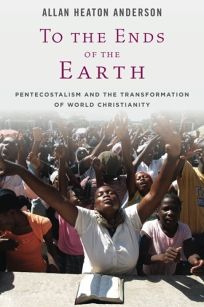Allan Anderson: To the Ends of the Earth
 Allan Heaton Anderson, To the Ends of the Earth: Pentecostalism and the Transformation of World Christianity (Oxford: Oxford University Press, 2013), xvi + 311 pages.
Allan Heaton Anderson, To the Ends of the Earth: Pentecostalism and the Transformation of World Christianity (Oxford: Oxford University Press, 2013), xvi + 311 pages.
To the Ends of the Earth examines the historical and theological impact of global Pentecostalism on modern Christianity. Pentecostalism is the fastest growing religious movement in the contemporary world. In this fascinating study, Allan Anderson, professor of Global Pentecostal Studies at the University of Birmingham, draws from over twenty years of active ministry experience in the South African Pentecostal context.
This work is divided into nine chapters. Anderson examines the ubiquity of twentieth century revivals, as well as the origins, missionary dynamics, and migrational structure of the movement (chapters one, two, and three). The author proceeds to address issues of gender, family and community dynamics, in addition to the global meaning of renewal in light of the Pentecostal full gospel (chapters four, five, and six). Chapters seven, eight, and nine are devoted to the themes of Christian transformation and independence, the relationship between charisma and faith, and Pentecostal entrepreneurialism.
In the last century, the southern hemisphere has served as the arena for a remarkable expansion of Pentecostal forms of Christianity. This expansion represents a change in the global trajectory and demographics of Christianity beyond anything previously imagined. Independent Pentecostal churches in particular proliferate on the new international playing field, expanding rapidly while spawning their own unique traditions. Pentecostals now represent a quarter of the world’s Christian population, some 614 million adherents worldwide. This staggering figure is best explained with reference to developments in the majority world—South America, Africa, and Asia. The impetus to evangelize and expand on these continents is “underpinned by a firm belief in the Bible as an independent source of authority, one that resonates with local customs and relates better to a spiritual and holistic worldview” (249). Working in tandem is a Protestant regard for biblical authority and a “renewalist” emphasis on the Spirit’s empowering presence—the result is a potent, transformative brand of Christianity.
What is most intriguing about the Spirit’s work in these contexts is the proliferation of indigenous types of Christianity. In many places Western missionaries are considered a nuisance, and in some nations even heretical. Spirit-led revival movements have tended to challenge the notion of Western hegemony. In continuity with the revival tradition, Pentecostalism is a liberative movement, freeing ordinary people from colonial and ecclesiastical oppression, while introducing free enterprise to the world’s religious marketplace. Anderson is not suggesting that Western missionaries should be discouraged in their pursuits to share the gospel, but that the path to success on the new Pentecostal frontier exists in partnering with indigenous churches and encouraging local leadership.
In a pluralistic age, To the Ends of the Earth promises the continued success of world Christianity through the many Pentecostal manifestations of the miraculous. As Pentecostalism traverses race, gender, and class barriers, it adapts in new cultural contexts, promoting vital, energizing forms of worship. This can be seen in the vivid liturgies, music, and dance of majority world peoples who have embraced the contemporary work of the Spirit. Pentecostalism provides “primitive” cultures continuity with their “spirit world” origins. Anderson points to the future of world Christianity found soaring on the winds of renewal. Pentecostalism has emerged as the formidable instrument of this renewal by offering the majority world a tangible expression of communal identity, healing, deliverance.
Reviewed by Paul J. Palma
Preview To the Ends of the Earth: https://books.google.com/books/about/To_the_Ends_of_the_Earth.html?id=Fdn3dMgyJL0C


